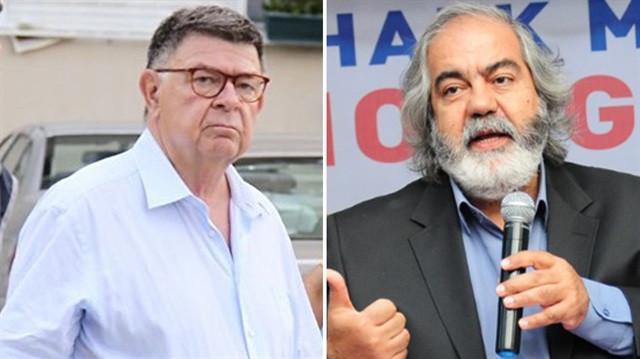
The Constitutional Court’s ruling that the jailing of journalists Şahin Alpay and Mehmet Altan during the trial violates their constitutional rights “is not the final decision,” Prime Minister Binali Yıldırım has said.
Yıldırım told reporters on Jan. 12 that the local court will “give the right decision as it has the full knowledge about the case.”
According to the Turkish Constitution, the Constitutional Court is legally superior to lower courts and its rulings are binding, but its Dec. 11 decision on Alpay and Altan drew the ire of some ruling Justice and Development Party (AKP) members.
Yıldırım, however, said debating the Constitutional Court’s ruling would not be in line with the principles of a state of law.
“Rushing to comment would be unfair to the court,” he added, noting that the top court merely ruled against the grounds for arrest during the trial.
The Constitutional Court’s decision covers the pre-trial detention period, before the preparation of the prosecutor’s indictment, and the process after the indictment should be left to the local court’s decision, Yıldırım said.
“The first decree court responsible for the case has the deepest knowledge about the case file. Neither we nor the Constitutional Court knows its content,” the prime minister added.
He also called on all courts and all state institutions to be “careful when making decisions” in order to not weaken the ongoing struggle against the Fethullahist Terrorist Organization (FETÖ).
“As the executive organ, our expectation is that one should not take a decision that would weaken [the struggle] or be interpreted in this way,” Yıldırım said.
Deputy Prime Minister Bekir Bozdağ was more openly critical of the Constitutional Court ruling.
“[With the ruling], the Constitutional Court has gone beyond the limits set by the constitution and the laws, acting as a first degree court by evaluating the case and the evidence,” Bozdağ wrote on his Twitter account on Jan. 12.
“When ruling on individual applications, the Constitutional Court cannot act as a first degree court or an appeals court and rule accordingly,” he added.
AKP Deputy Chair Hayati Yazıcı said the “Constitutional Court should use its authority, which is given for improvement of the state of law, very precisely, meticulously and carefully.”
The Istanbul court rejected the order of the Constitutional Court “because apparently it has the same view about the ruling,” Yazıcı said at a press conference.
“It is extremely sad that there are processes in the courts that will lead to disputes. We should not be discussing courts,” he added.
Local court resisted top court’s order
Hours after the Constitutional Court’s decision, two Istanbul High Criminal Courts where Alpay and Altan are being tried resisted the higher court’s ruling, saying the verdict had not yet been published in the Official Gazette.
In a move that could have been considered a reply to the local courts, the Constitutional Court’s official Twitter account then posted a tweet stating that all fully detailed rulings are available on its official website.
The Constitutional Court’s decisions are legally binding for lower courts, which are not free to recognize or dismiss rulings as they wish.
“Trial courts do not have the authority to consider, dismiss or reject Constitutional Court rulings. In this case they can only now decide for [Alpay and Altan’s] immediate release,” Professor Yaman Akdeniz, a law academic at Bilgi University, posted on his official Twitter account on Jan. 12.
Precedent for other cases
Before the local courts refused to release Alpay and Altan on Jan. 11, lawyer Veysel Ok, who submitted the application to the Constitutional Court on behalf of Alpay, had said the top court’s decision could stand out as a precedent for other journalist trials in Turkey.
“This ruling, which is the first application of its kind since the [July 2016] coup attempt, should set a precedent for all trials,” Ok said.
“It clearly states that news stories and opinion pieces cannot be used as evidence of a crime. I hope this ruling is the first step toward the broader expression of the right to freedom of expression in the country,” he added.
The two journalists, who have both been in prison for more than a year so far, were jailed in the aftermath of the coup attempt.
Both Altan and Alpay are accused of “links to terrorist groups” and “attempting to overthrow the government,” charges they have denied.
An Istanbul prosecutor sought in December last year aggravated life sentences for each of the six suspects in the case probing the “media wing” of the Fethullahist Terrorist Organization (FETÖ), including Altan, his brother Ahmet Altan, Nazlı Ilıcak and three other suspects currently under arrest who face aggravated jail terms for “violating the constitution” and “having prior knowledge of the coup.”
Around 160 journalists are currently in jail in the country, according to the Turkish Journalists’ Association.
International journalism groups say Turkey is now the world’s largest jail of journalists.
Many of the jailed reporters have been charged with spreading propaganda for the outlawed Kurdistan Workers’ Party (PKK) or the network of the U.S.-based Islamic preacher Fethullah Gülen, widely believed to have masterminded the coup attempt.
European Council President Jean-Claude Juncker warned on Jan. 12 that there could be “no progress” in Ankara’s relations with the European Union “as long as journalists are detained in Turkey.”